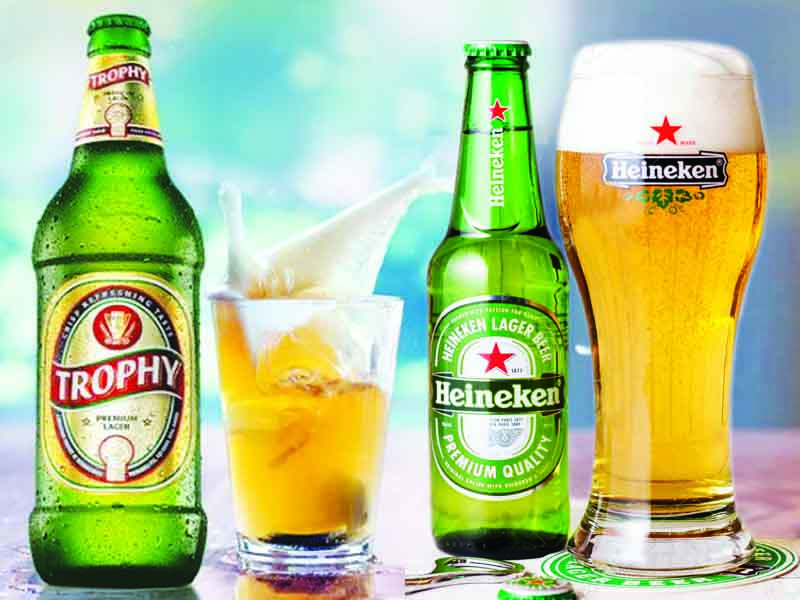Between Two Beers: Trophy vs. Heineken
March 16, 20209.5K views0 comments
Over the years, beers have become increasingly popular in Nigeria. Not only do a lot of people prefer beer to other alcoholic drinks for having a characteristic lager feel unlike spirits and locally brewed drinks, but also there is the fact that it is readily available, as more and more brands continue to establish in the Nigerian market, with each offering a unique value for the beer lover.
Heineken Beer is known for sophistication, being an international premium beer manufactured by Heineken brouwerijen B.V Amsterdam, available in about 192 countries around the world. In Nigeria, Heineken is brewed and bottled by Nigerian Breweries Plc. Ordinarily, one would expect we channel this research comparing Heineken and the American lager beer, Budweiser made by AB InBev’s International Breweries Plc, for both being international brands. This is not the case, as Budweiser which was launched in Nigeria in April 2018 is yet to gain much traction in the Nigerian market. Trophy Beer, another product of International Breweries, on the other hand, is a favourite and checks many criteria the average beer consumer is interested in. These two brands, Trophy and Heineken currently have a huge appeal amongst beer consumers in Nigeria. While government continually tries to regulate the amount of alcohol in alcoholic beverages produced in the country, even as a number of beer manufacturers make public knowledge the percentage of alcohol in their products. This is clearly insufficient for consumers to get the most out of beer consumption, as there are countless health benefits and side-effects associated with the consuming beers, depending on which applies to you. And as for Trophy and Heineken, one thing is sure – they are similar yet different in numerous ways. Here’s how…………..
- On first look, the general notion seems to be that Heineken is for people of higher class, and those who are rich by societal standards. Trophy on its part, has a wider range of consumers from different social classes. In reality, and based on overwhelming facts and evidences, this may not be entirely true.
- Both Trophy and Heineken are made with malted barley, hop extracts water; an additional ingredient for Trophy is maize grits, while yeast gives Heineken its distinctive fruity flavour.
- A bottle of Trophy beer weighs 600ml, while a bottle of Heineken beer weighs 60cl, which is the same. The cost being the difference, Trophy sells for N250, and Heineken sells for N300 obviously more expensive.
- Both also have can packaged equivalent, Trophy 500ml and Heineken 33cl, sold at N200 and N300 respectively. Trophy offers more value in quantity here by a difference of 17cl and in cost.
- Heineken’s nutritional value per 100% energy is 176kj/ 42kcal which is sufficient with respect to standard nutritional values for beer worldwide. Not much is known of Trophy’s nutritional value, as the information is not available on the product’s package and website.
- The manufacturers of both products claim 5% alcohol content in them, which is appropriate for beer considering the amount of alcohol in other lagers; for instance, Guinness has 7.5%, Gulder has 5.2%, Star 5.2% and Harp 5.1%.
- Consumer’ opinions across board, reveals that approximately 61.8% percent people think Trophy is more alcoholic than Heineken. Many specifically said Heineken is a safer option.
- In addition to bottle and can packaging, Heineken can also be found in Draughtkeg, though not so common except in certain hotels and premium bars in major cities across the country.
- There is Trophy Black Lager and Trophy Premium Quality Lager Beer, while the former is darker and stronger than the former, it is quite rare these days, according to some beer dealers. Heineken does not have variants.
- Many suggest Trophy has more frothing content (beer bubbles) than Heineken.
- The taste of the beer remains in the mouth for a longer time (even after eating) with Trophy than Heineken.
- Malted barley taste is evidently present in Trophy, this taste is fainter in Heineken.
- There are higher chances of vomiting after drinking Trophy, than in Heineken.
- A good portion of consumers noted that Heineken is better refined and filtered than Trophy.
- When we asked consumers of their experiences drinking both beers, here are interesting facts we found: Trophy causes weakness in the legs, insomnia, drowsiness and decrease in irritability whereas, Heineken can give beer belly or pot belly, and fats on the hips and waist.
- A consumer who drinks Trophy beer daily, said his doctors suggested it as good for treating congestive heart failure. Generally, beers are often used to help prevent heart and circulatory diseases, and various scientific studies have reported that people who drink a moderate amount of beer have a lower risk of developing Type 2 diabetes.
- Heineken beer which contains a special yeast, is a great addition to your daily beauty routine, as this helps improve skin and hair health. Antioxidant compounds and enzymes derived from the process of fermentation in this beer are rich in vitamins and proteins, and are known for having these effects.
- Both Trophy and Heineken contain malted barley, and barley contains gluten – a type of protein. It should be noted that people who are allergic to gluten need to reduce or stay away from the consumption of both brands. Why? They contain some stimulants that work with gastric acid, which may eventually result in heartburn.
- Strong alcohol are widely believed to be to be dangerous to health, the damage it does varies from person to person. But one thing is certain, all beers are mild beverages and does less harm. However, do not take our word for it, you may need to visit your doctor or health consultant.

